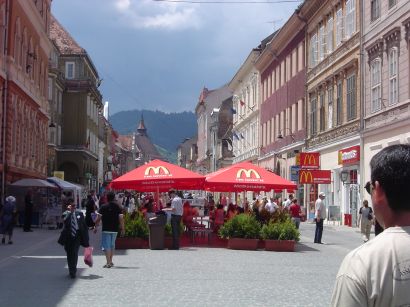
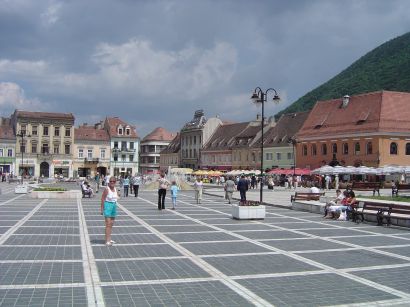
Nobody beat us out of Brasov at 8:30 AM on Sunday morning.
 |
 |
|
|
|
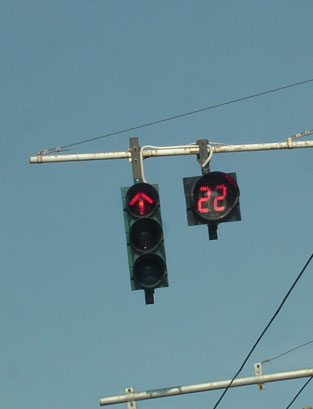 |
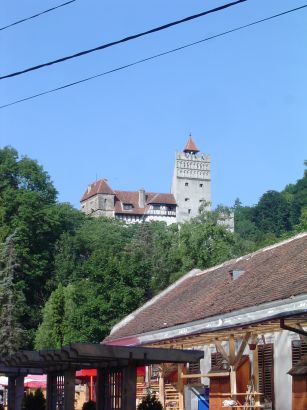 |
|
|
|
We drove straight to Bran Castle and stood in line at 9:00 AM, when the gates opened. Dracula had himself a pretty nice castle, I must say. With some 50 rooms, each had it's own wood-burning stove for heating. There was even a secret passage, from one level up to the next. It opened up in the middle of a bookcase, as one might have expected.
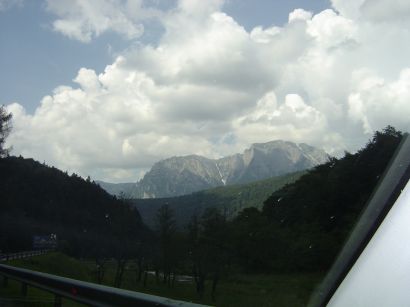 |
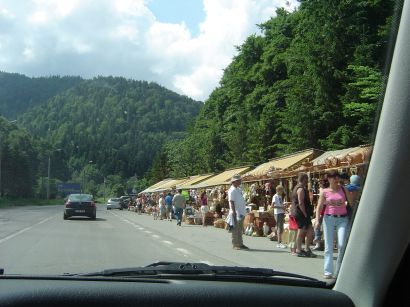 |
|
|
|
On the road to Bucharest, our "Sunday is the Best Day for Driving" strategy was severely tested. The roads were crowded with travelers looking for a pleasant afternoon in the Carpathian mountains. Some found it along streams near the road; perhaps a hundred cars had pulled off to picnic or go fishing. Others visited the mountain villages, where many more copies of Snow White waited patiently at the road-side.
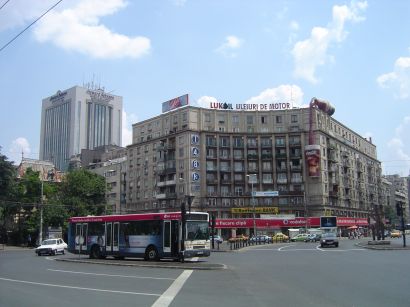 |
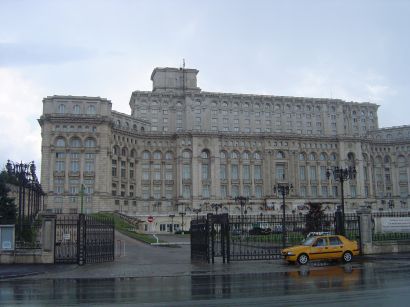 |
|
|
|
We followed the signs to Bucharest's "Centru" and found a Howard Johnson "Grand Hotel" towering over an almost deserted plaza. They wanted 260 Euro ($330) for a night, so we followed their instructions to a much smaller hotel a few blocks away. They wanted 3,125,000 Lei, which was a much better deal ($75).
Sensing quickly that the city wasn't going to live up to the reputation of, say, Paris, we decided to see what we could and leave the next morning. I chose the Parliament building as a destination. Ceausescu destroyed 26 churches, two synagogues, a monastery and left 70,000 people homeless to build this Casa Poporului, or House of the People, during the 1980s.
Instead of driving, we took an 8-stop Metro trip. The hotel clerk gave us a scrap of paper with the name of the station we wanted, but finding which track we wanted wasn't so easy. Plenty of people spoke English, but none, apparently, had any knowledge of the subway system. First this track, then the other, then to a central station for a transfer. Even the very helpful ticket agent, who came out of her booth to show us how to insert our ticket into the turnstile, had to confer with passers-by. In the end, we got on the right train and stayed on for the right distance.
We popped out of the subway to find that it had started to rain while were underground. Dodging puddles, we arrived at the front gate just in time to find that the building closed for the day in 5 minutes. "Come back tomorrow," suggested the guard, who refused to let Elsa stay out of the rain under his roof while I took a picture.
The building was impressive, covering a large city block and 12 stories high. The grass in the show-place park across the street, however, was badly in need of cutting and many of the lamps lighting the walk-ways were broken. We headed back to the Metro for the ride back to the hotel, figuring we had given Bucharest our best shot.
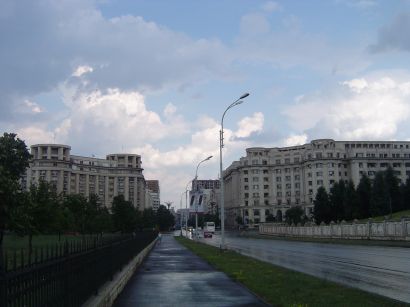 |
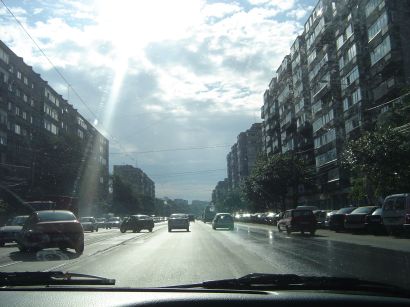 |
|
|
|
The road from Bucharest to the Black Sea city of Constanta is as straight as an arrow. Traveling 140 km/hr was not a problem, except for the guy who passed us and got pulled over. Arriving in Constanta at noon, we expected to find nice, sandy beaches and maybe a palm-tree or two. What we found was wall-to-wall traffic, intent on going the same direction we were going, and Romania's largest port, taking up the beach. We struggled through the maze and found the road south toward Mangaria, hoping that some peace and quiet could be found along the coast.
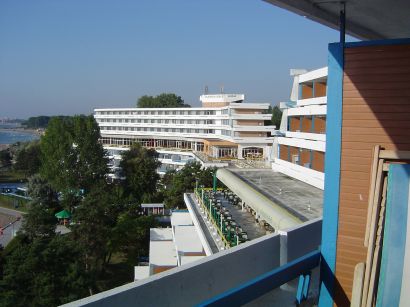 |
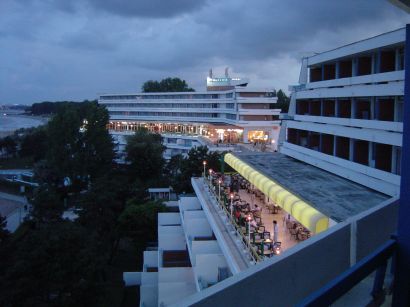 |
|
|
|
We found the Russian version close to the Bulgarian border at Neptun-Olimp. Before the 1989 revolution, this was the exclusive playground of Romania's Communist Party. The Communists are gone, but the Russian architecture remains. With many to choose from, we picked one of three hotels in a single building built in the shape of a shallow "U". Carefully constructed so the noise from the elevators reverberated through the entire structure, they showed their age. All of the windows and mirrors were made of poor quality glass, giving everything a wavy fun-house image.
The waves crashed a few floors below our beach-front room as a full moon rose from the clouds over the Black Sea.
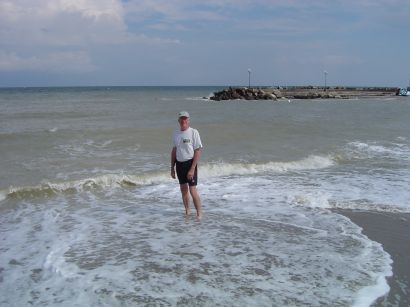 |
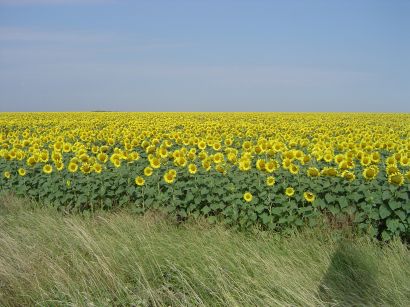 |
|
|
|
On the way out of Neptun, we passed through Jupiter, Venus and Saturn.
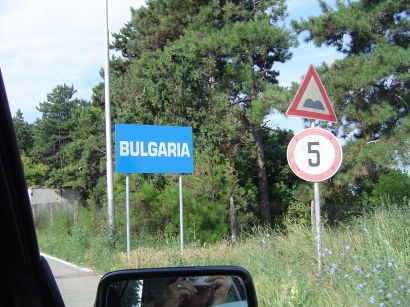 |
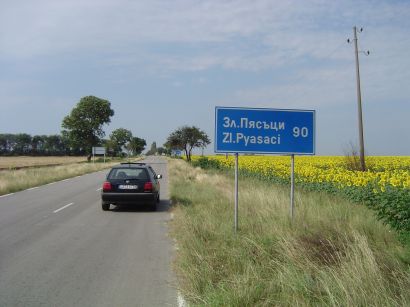 |
|
|
|
Disco music and dog concerts, well into the night, encouraged us to put off a day of rest. Crossing the border into Bulgaria was easy. We paid a 10 Lei environmental fee, permitting us to drive through a shallow pool of disinfectant, and another 6 Euro for a Bulgarian vignette, a road tax sticker.
The roads in Bulgaria are marked with signs using the Cyrillic alphabet, making them both unreadable and unpronounceable. Fortunately, enough have dual markings with Western names to get to and from the bigger cities. It takes two people to navigate, however. One drives and the other tries to match the road-signs with the map names, also in both languages.
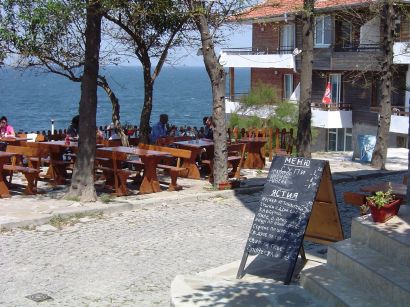 |
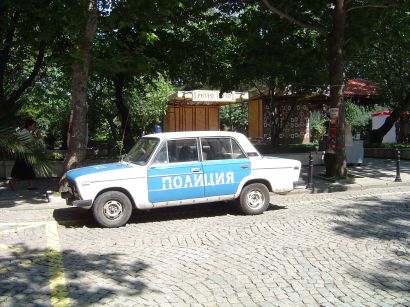 |
|
|
|
We passed a winery with a sign in front offering "Wine Test", so we dropped in to test some wine. The reds were bitter, so we bought a rose and a white, in the spirit of the warm welcome we were given.
Construction of high-rise beach apartments is choking the roads (and the environment) just north of Burgas, so we continued south to Sozopol, finding a pleasant, quiet beach city.
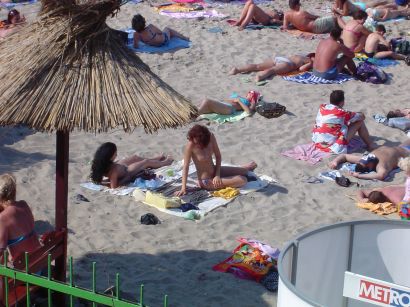 |
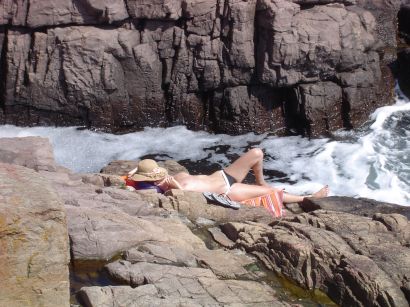 |
|
|
|
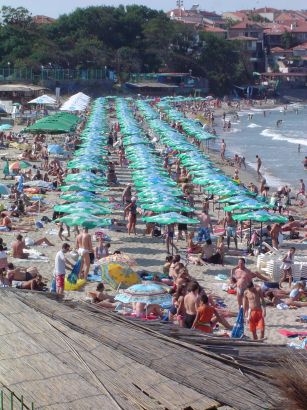 |
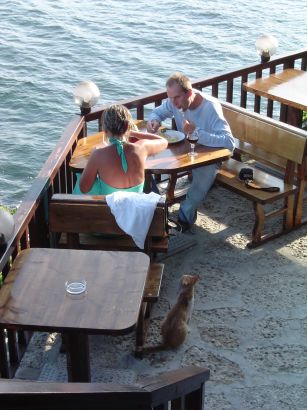 |
|
|
|
It seemed strange that everybody should be heading to the Sozopol beach at 9:00 AM. We found out why at 1:00 PM, when the wind switched from "off" to "on". We had already enjoyed a swim in the Black Sea and had moved to a beach-front restaurant by that time. Many cleared out as the green swimming flag came down and the red flag went up.
Dinner was served watching the sun set over the city. A skinny little cat joined us for some table-scraps. Any cat that eats potatoes must be hungry. When we ran out of food, it went on to the next table.
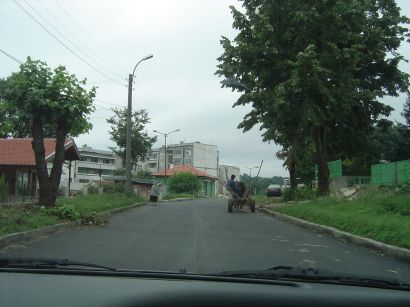 |
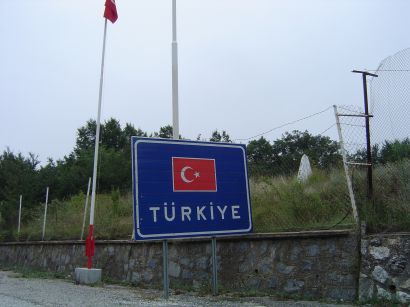 |
|
|
|
The idea was simple enough... just a short detour through a corner of Turkey to get another stamp in the passport. The execution left a lot to be desired. Getting out of Bulgaria was easy. Getting out is always easy. We spent almost an hour (and $50 for visas) getting into Turkey. The northeast corner of Turkey looks exactly like the southwest corner of Bulgaria. Street-side cafes in the small towns we passed through were filled with men (never any women) smoking cigarettes and waiting for something, anything, to happen. It never has, and probably never will.
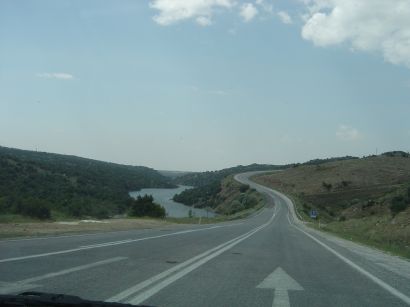 |
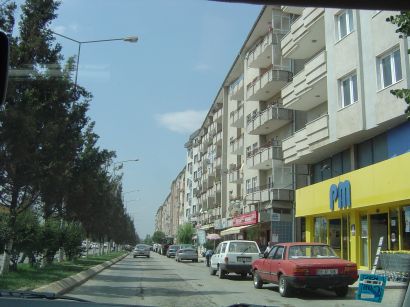 |
|
|
|
Failing to find a gas station near the Bulgarian border, I was forced to buy fuel in Kirklareli, Turkey, the most expensive we encountered. It took 120.1 Turkish Lirasi to fill the tank. A premium of a free beer glass for every 60 Lirasi spent kicked in, so I walked out with two industrial-strength glasses.
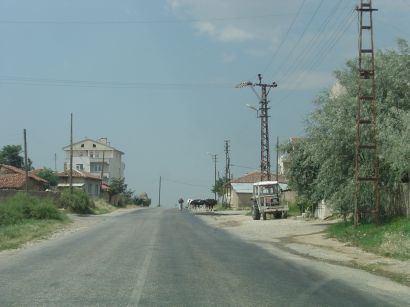 |
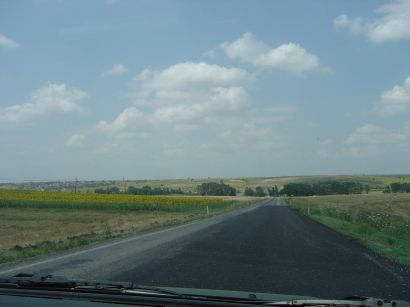 |
|
|
|
A truck stop along the road near Edirne provided a fine lunch. Some of what we ate looked like food we had seen before and some didn't. No amount of quizzing got us a definition of what the other stuff was.
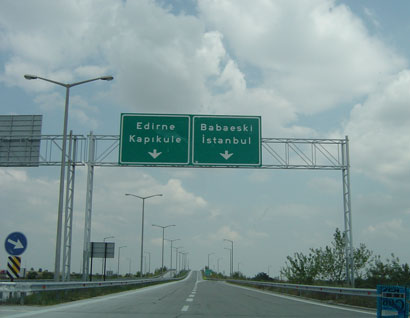 |
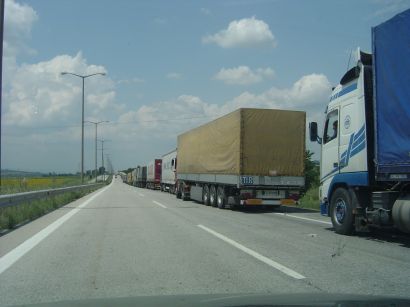 |
|
|
|
Signs told us where to turn for a 250 km run to Istanbul. It was tempting, but fear prevailed, and I continued along our planned route. Istanbul will still be there another day.
Getting back into Bulgaria called for about ten stops for numerous officials to flip through our passports. They have never seen so many stamps on so many added pages. Never sure if we had actually crossed the border, we just followed the car in front of us and went where it went.
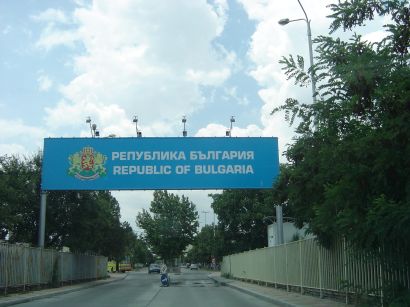 |
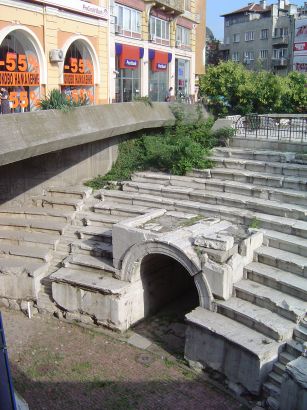 |
|
|
|
Toward the end of the circus, we were asked for 2 Euro for a disinfection fee. This was a surprise, since neither Turkey or Bulgaria use the Euro. I handed over 4 Bulgarian Leva, which was the exact amount required. The clerk refused it, saying he knew it was a problem, but Euros it must be. We dug around under the car seats and found enough Euro coins to get us out of there. Our receipt shows we paid the Republic of Bulgaria National Veterinary Service for disinfection and mechanical spraying of motor vehicles of foreign country registration. The rest is in Cyrillic and can't be read by mere mortals. Fortunately for us, they sprayed the outside of the vehicle, not the inside.
The final score was: two hours at the borders, three hours of driving in Turkey, and the experience, well, not exactly priceless.
Facing a short day, we felt obligated to wander the Old City of Plovdiv, billed as Bulgaria's prettiest city and the one with the most Roman ruins. Maybe the second claim is true. The Ancient Theater of Phillipopolis, at the top of the list, is surrounded and almost overwhelmed by the walking zone. Concrete supporting a restaurant juts out over what used to be the stage. Seats that have crumbled away have not been replaced or repaired; the space has been covered with more concrete. Banks, jewelry stores and watch shops have prospered at the expense of the ruins.
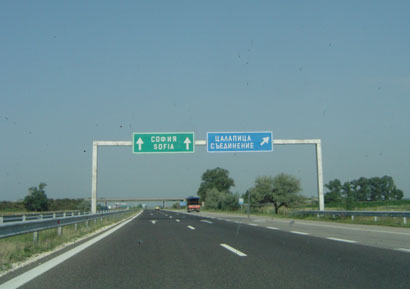 |
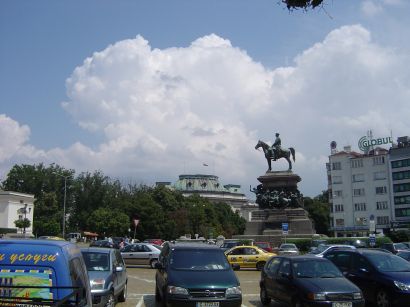 |
|
|
|
The streets are paved with gold bricks in Sophia. Well, OK, they're gold-painted bricks. Our Radisson hotel was centrally located, a short walk from the major attractions. The obligatory statue of a guy sitting a horse is in front of the hotel.
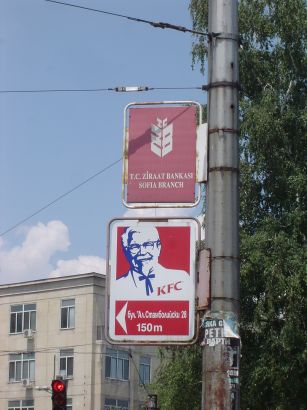 |
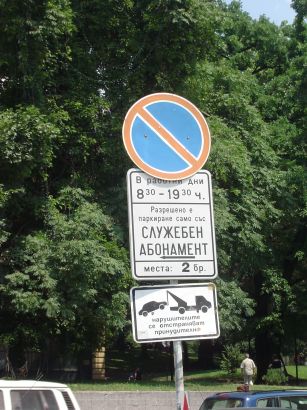 |
|
|
|
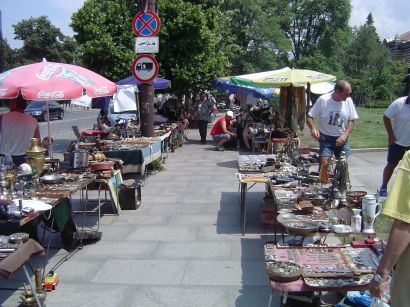 |
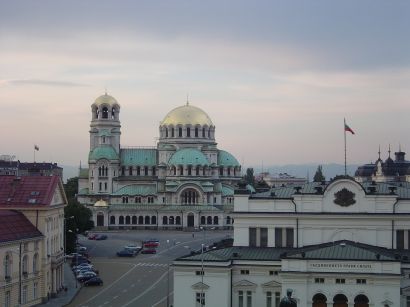 |
|
|
|
Lots of German and Russian war ribbons and pins were for sale in the flea market near the Aleksander Nevski Church. They were a reminder of Bulgaria's varying allegiance during WW II.
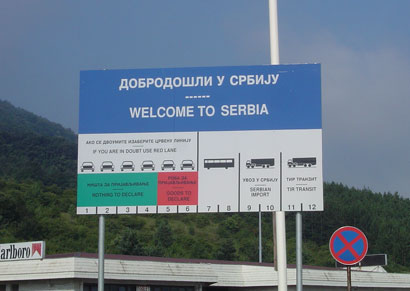 |
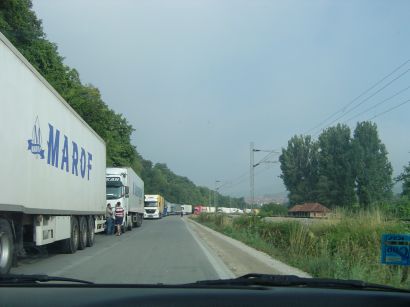 |
|
|
|
One must pass through the city of Nis, Serbia, on the road north to Beograd. Nis is a forgettable city, full of sad-looking people driving around in sad-looking cars.
A hundred kilometers north, a little more than an hour later, we stopped for gas and lunch at a freeway rest-stop. While we were waiting for our food, a bus from Nis arrived and all the passengers raced for the restaurant, not for food, but coffee and a cigarette. All boarded again when their allotted time was over, but in a minute all the men were back out on the street. Getting behind the bus, they pushed as hard as they could, giving the bus enough momentum to allow the driver to pop the clutch and start the engine. Cheers went up along with a cloud of exhaust smoke, everybody re-boarded, and they disappeared down the road.
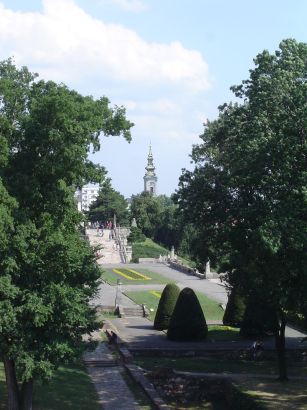 |
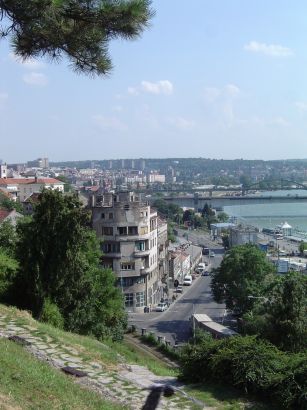 |
|
|
|
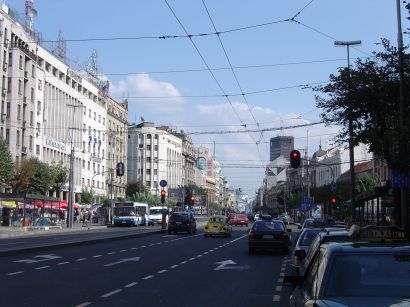 |
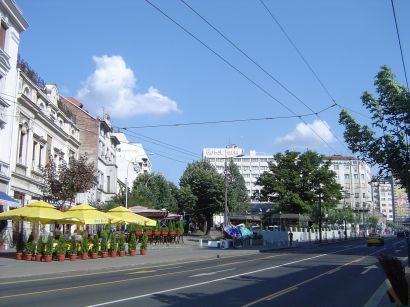 |
|
|
|
Looking from a few blocks away, over the flower gardens and lush green trees, you would think the Hotel Park in Beograd would be a nice place to spend the night. Things started going wrong as soon as we checked in. The TV remote, aside from not working at all, fell apart in my hands. Then the hotel laundry service started using water through pipes buried in the wall by the head of the bed, creating a noise like Niagara Falls. The manager came up and explained how we could pay more to get a quiet room down the hall.
The car was, by this time, in the garage, deep in the bowels of the hotel, so there was no chance of making a hasty retreat. I put it there myself, backing it off the street, down a narrow alley and into the automobile elevator. After dropping three floors underground, I drove the car forward out of the elevator, to it's parking spot.
The noise issue settled, we turned in at 10:00 PM. By midnight, the room was so hot nobody could sleep. Opening the windows, even on the 7th floor, let in too much street noise to solve the problem. I poked around with the air-conditioner controls and found the electricity was off. A quick call to the front desk confirmed the problem; all of the room air-conditioners are turned off at 11:00 PM and are turned back on at 6:00 AM. I explained that I would be leaving at 6:00 AM and they could turn it off from then until noon, a different six hours to be sure, but important to me. My English logic didn't translate into Serbian action.
I backed the car into the elevator after breakfast, rose three floors and roared out forward into the street. Elsa was waiting there with the luggage. We loaded quickly and bid Beograd goodbye.